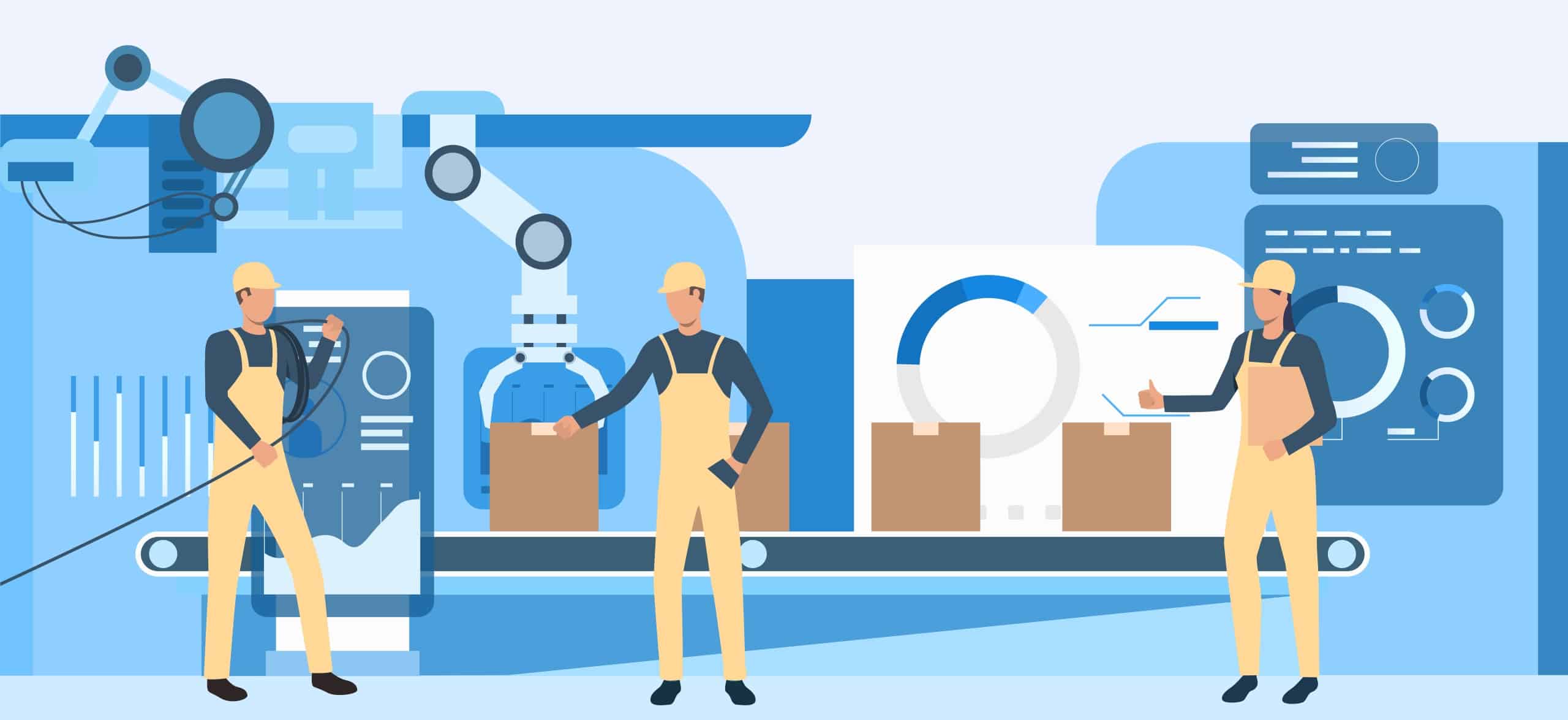The Evolution of Wet Wipe Production
Advancements in technology and operations have significantly changed the manufacturing of wet wipes, reflecting their progression throughout time. The evolution involves not only increasing manufacturing capacity but also improving flexibility and efficiency to adapt to evolving customer expectations and environmental regulations.
Transitioning from Manual Assembly to Automated Precision
Originally, wet wipes production was mostly done manually. Initially, manufacturing used basic, manual techniques where materials were hand-cut, moistened, and packed. This method restricted the manufacturing pace and the capacity to maintain uniform product quality.
The industry transitioned towards automation due to the growing demand for wet wipes driven by increasing hygiene requirements and the convenience of disposable cleaning goods. Initial automated wet wipes machines were created that could manufacture wet wipes at increased velocities. The wet wipes machines were mainly designed to enhance production but had limited adaptability for various product kinds or sizes.
Customizable Machinery Integration
The true shift started when configurable equipment was integrated, adding variety to wet wipes manufacturing lines. Contemporary wet wipes machines include modular components that may be readily altered or replaced to transition between various product standards with little downtime. Wet wipes manufacturers may modify the size of the wipes, the fold style, and the packaging choices via simple machine modifications.
Sophisticated Features and Intelligent Technology
Modern wet wipes technology utilizes state-of-the-art technologies including robots, artificial intelligence (AI), and the Internet of Things (IoT). These technologies facilitate accuracy and automation throughout the wet wipes manufacturing process. Robotic arms are capable of doing complex actions such as folding wipes into different patterns and packing them according to real-time market information or unique client needs.
AI improves production efficiency by adjusting the quantity of solution used to wet the wipes, guaranteeing that each batch satisfies quality criteria while reducing waste. IoT connection enables instant monitoring and management of the production process, facilitating remote problem-solving and maintenance, leading to a notable decrease in downtime and enhancement of operational efficiency.
Sustainable Production Methods
Another crucial feature of the development in wet wipes manufacturing is the growing emphasis on sustainability. Contemporary wet wipes machines are created to support environmentally friendly materials, such as biodegradable and compostable substances. Wet wipes manufacturers may modify machine configurations to decrease resource use and integrate recycled materials, supporting worldwide initiatives to minimize the environmental footprint of throwaway goods.
The transition of wet wipes manufacturing from manual methods to sophisticated, adaptable technology showcases the industry’s adaptation to worldwide trends and obstacles. Modern technology can handle the high-volume needs of worldwide markets while also providing the capability to manufacture a variety of top-notch and environmentally friendly hygiene products. Adaptability is essential when customer tastes and regulatory requirements change, pushing the limits of what can be accomplished in producing hygiene goods.
Tailored Solutions for Diverse Markets
The customization feature of wet wipes machines highlights their capacity to adjust and change production to meet the varied requirements of several international markets. Flexibility is essential in a sector because customer preferences, local legislation, and environmental factors might differ greatly across regions.
Adaptation to Specific Local Preferences and Requirements
Wet wipes are used in several contexts, including personal hygiene, infant care, cleaning, and healthcare. Each use often has special requirements for size, texture, moisture content, and additives. Wet wipes manufacturers may easily adjust these elements using advanced wet wipe machines. In areas with significant demand for baby wipes, wet wipes machines may be modified to create softer and more sensitive wet wipes that are kinder on the skin. In contrast, machines in industrial environments may be configured to manufacture sturdier wet wipes designed for rigorous cleaning tasks.
Adherence to Local Regulations
Various nations and areas may have distinct restrictions regarding the manufacturing and ingredients of wet wipes. Some governments may prohibit certain chemicals or mandate the use of biodegradable materials to tackle environmental issues. Customizable wet wipes machines may meet regulatory standards by modifying the fibers, chemicals in moistening solutions, and packaging materials. This versatility guarantees that items may be marketed in different countries without facing legal complications.
Environmental Issues
Environmental sustainability is becoming more important in consumer items, including wet wipes. Adaptable wet wipes technology may be modified to use eco-friendly materials such as bamboo, cotton, or other biodegradable fibers in place of conventional polyester or polypropylene. Moreover, these wet wipes machines can regulate the quantity of moisture and chemicals used, hence minimizing waste and environmental footprint. In markets with environmentally sensitive customers, producing eco-friendly items may greatly improve a brand’s image and market share.
Industry-Specific Innovations
Wet wipes manufacturers may develop and produce specialized items for certain markets by swiftly changing production parameters. In countries facing disease outbreaks, wet wipes manufacturers may quickly adjust manufacturing to incorporate disinfectant wipes with increased levels of antibacterial or antiviral agents. Production may be customized to fulfill the need for fragrance-free goods in areas where they are favored because of allergies or sensitivities.
Optimal Performance and Capacity for Growth
Adaptable wet wipes machine enables a wider range of products to be made and improves the efficiency of manufacturing. Wet wipes manufacturers may save downtime by using adaptable systems that allow for easy adjustments when moving between various goods. This feature enables the use of lower batch sizes as needed, making it cost-effective to cater to specialized markets without requiring extensive inventories.
Customized solutions in wet wipes manufacturing showcase how advanced production technology may fulfill the diverse and intricate requirements of a worldwide market. Wet wipes manufacturers may use customized wet wipe technology to assure compliance and satisfaction in various markets, as well as to promote innovation and sustainability in their product range. Strategic flexibility is essential for maintaining competitiveness in a fast-changing sector.
Enhancing Efficiency with Smart Technology
Incorporating smart technology into wet wipes machines greatly improves production efficiency, providing wet wipes manufacturers with considerable advantages in operation and cost-effectiveness. Technological breakthroughs such as Artificial Intelligence (AI), the Internet of Things (IoT), and robots enhance production lines by making them smarter, quicker, and more flexible.
Artificial Intelligence (AI) in Optimization
Artificial intelligence is crucial in contemporary wet wipes machines since it enhances several facets of the wet wipes manufacturing process. AI can regulate the moisture and solution quantity for each wet wipes using sophisticated algorithms, guaranteeing that each product adheres to precise requirements while minimizing waste. This enhances product quality consistency and decreases chemical and water use, promoting sustainable manufacturing methods.
AI improves quality control by using image recognition tools to identify faults or irregularities in wipes during production. Real-time quality assurance minimizes waste and guarantees that only items matching the highest requirements are released to the market.
Utilizing Internet of Things (IoT) for connectivity and monitoring purposes.
IoT technology enables wet wipes machines to be integrated for centralized monitoring and control. This connection allows wet wipes manufacturers to monitor and control wet wipes manufacturing processes from different places, enabling prompt modifications and interventions as needed.
IoT technologies monitor equipment components to notify maintenance crews of possible problems before they lead to downtime. Predictive maintenance, using IoT technology, may minimize unforeseen failures by arranging repairs and component replacements according to real wear and use data rather than predetermined timetables. Being proactive may result in significant cost savings and reduced disruptions in manufacturing processes.
Robotics for Precise and Flexible Applications
Robotic elements in wet wipse machines improve the accuracy of wet wipes manufacturing processes including cutting, folding, and packing. The robots can execute intricate moves with precision and consistency, crucial for creating wipes that align with various customer preferences regarding size, thickness, and texture.
Furthermore, robots provide flexibility in wet wipes manufacturing. Robotic arms may be designed to swiftly transition between several activities, hence decreasing the time and expenses linked to manual reconfiguration. This enables the creation of specialized goods in shorter batches, making it economically viable to target niche markets or create limited-edition items.
Utilizing Data Analytics for Ongoing Enhancement
Analyzing the extensive data gathered by intelligent wet wipes machines may provide valuable insights into production efficiency, customer preferences, and opportunities for innovation. Wet wipes manufacturers may use this information to consistently improve their operations, modify product characteristics, and better adapt to market changes.
Data analytics helps optimize inventory management and supply chain logistics by ensuring that raw materials are bought and stored according to real-time manufacturing demands and that final goods are dispersed effectively.
Improving productivity via intelligent technology in wet wipes manufacturing involves working more intelligently, not simply more quickly. Wet wipes manufacturers may enhance accuracy, flexibility, and efficiency in their production lines by using AI, IoT, and robots, resulting in improved product quality and reduced operating expenses. Technological advancements will be essential for wet wipes manufacturers to remain competitive in the evolving market for hygiene goods.
Meeting Global Sanitation Standards
Adhering to international sanitation regulations is essential for wet wipes manufacturers, particularly due to the frequent usage of these products in environments where cleanliness is of utmost importance such as healthcare, childcare, and food services. Wet wipes manufacturers must adjust their manufacturing methods to meet stricter requirements as global health concerns and regulations change. Customizable wet wipes technology is crucial for meeting compliance requirements as it allows for accuracy, flexibility, and consistency in manufacturing.
Compliance with International Health Regulations
Wet wipes manufacturers must handle diverse international health requirements that might differ greatly between regions. These rules often include approved components, labeling requirements, and effectiveness criteria, especially for wipes that advertise antibacterial or antiviral effects. High-tech equipment enables accurate application of sanitizing solutions and additives to fulfill the rules of different markets for each batch of wipes.
In the European Union, items having germ-killing characteristics must be registered and authorized under the Biocidal Items Regulation. Adaptable equipment allows producers to easily and effectively modify the composition of goods to meet rules without interrupting the wet wipes manufacturing process.
Customization to Meet Various Market Demands
Various markets may possess distinct expectations and criteria for hygiene goods. In some areas, there might be an increased need for goods containing natural ingredients because of allergy issues or customer preferences. Adaptable wet wipes technology enables wet wipes manufacturers to simply change procedures, integrating natural or allergic substances and modifying wetness levels or fabric types to meet individual requirements.
Quality Assurance and Uniformity
Adhering to high-quality standards is crucial for regulatory adherence, customer confidence, and brand reputation. Contemporary wet wipes technology includes sensors and monitoring systems that continuously assess the quality of wet wipes throughout the manufacturing process. The systems are capable of identifying irregularities such as inaccurate moisture levels, inadequate sealing of packaging, or contamination. This guarantees that all products leaving the facility meet the highest quality criteria.
Standards for Sustainability
Aside from health and safety laws, there is an increasing need for environmental sustainability in product production. This involves using biodegradable materials and minimizing waste and energy use. By customizing equipment settings, eco-friendly wet wipes may be produced using various sustainable materials like organic cotton or bamboo fibers.
Scalability and Flexibility
Adapting fast is vital for preserving market access and competitiveness if rules change or new standards are implemented. Adaptable wet wipes technology allows for quick adjustments or increases in manufacturing capacity. This adaptability is particularly beneficial when dealing with abrupt changes in market demand or regulatory standards, enabling businesses to react promptly and efficiently.
Complying with international sanitary regulations is a complex task that demands wet wipe manufacturers to be precise and flexible. Utilizing sophisticated, adaptable wet wipes machinery allows wet wipes manufacturers to meet various international regulations, address diverse market demands, uphold quality and consistency, and promote sustainability. These factors are essential for maintaining competitiveness in a global market that prioritizes health, safety, and environmental awareness.
The Environmental Impact
The environmental consequences of wet wipes manufacturing are significant due to the extensive use and disposable characteristics of these items. With the rising awareness of sustainability among customers and regulators, wet wipes manufacturers are becoming more dedicated to reducing the environmental impact of their operations. Sophisticated adjustable wet wipes technology is crucial in enabling wet wipes manufacturers to use more sustainable practices in many areas of manufacturing.
Minimization of Waste and Resource Utilization
One major environmental issue related to wet wipes manufacturing is the creation of trash and the use of substantial resources like water and chemicals. Customizable wet wipes technology may solve these problems by improving wet wipes manufacturing processes to increase efficiency. These wet wipes machines can accurately regulate the quantity of moisture and cleaning solutions used, guaranteeing that each wet wipe is sufficiently soaked without any surplus. This decreases the wastage of chemicals and water while also reducing the discharge of these pollutants, which may be detrimental to the environment.
Utilization of Sustainable Materials
Conventional wet wipes are often composed of non-biodegradable synthetic fibers like polyester, leading to increased landfill waste and environmental damage. Advanced customizable technology enables wet wipes manufacturers to transition to sustainable materials such as cotton, bamboo, or other biodegradable fibers. Natural materials degrade more readily in the environment, decreasing the overall waste impact over time. Furthermore, some wet wipes machines can process recycled materials, decreasing the need for new resources and improving the sustainability of the goods.
Efficient Use of Energy
New wet wipes technology is designed to function with higher energy efficiency compared to earlier types. These enhancements may greatly decrease the carbon footprint of industrial processes. Energy-efficient wet wipes machines use cutting-edge technology to decrease power usage during manufacturing, benefiting the environment and lowering operating expenses for businesses.
Innovative Packaging
Environmental effects may be reduced by sustainable wet wipes packaging practices. Adaptable wet wipes machines may be customized to reduce the usage of packaging material or to transition to recyclable or biodegradable packaging alternatives. This minimizes the quantity of plastic used, which is essential given that plastic waste poses a substantial environmental issue. Advancements in package design, such as resealable packets that maintain wipe moisture without requiring extra plastic, aid in decreasing environmental harm.
Adherence to Environmental Regulations
Wet wipes manufacturers must guarantee their goods and operations comply with tighter global environmental rules to preserve market access. Adaptable equipment enables firms to promptly comply with new regulations, including restrictions on certain chemicals or requirements to decrease plastic use. Adaptability is crucial for maintaining competitiveness in a market where customers are placing growing importance on environmental credentials.
The environmental consequences of wet wipes manufacturing are a major problem, although they also provide an opportunity for innovation and enhancement. Wet wipes manufacturers may use sophisticated, customizable wet wipes machines to suit the increasing demand for eco-friendly goods and promote sustainability in the business. The modifications aid in decreasing the ecological impact of their goods and are in line with worldwide initiatives to advance sustainability in production.






